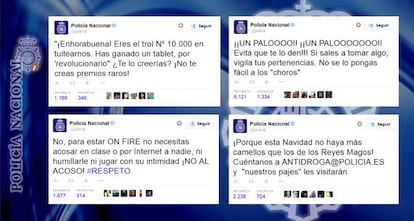L@w enforcement the Twitter way
Spain’s National Police have made effective use of the social network to raise their profile

“In 2009, I asked for a police presence on the social networks, the same as we have on the streets,” says Juan José Esteban, director of communication for Spain’s National Police. Five years later, more than 1,140,000 people follow @policia on Twitter, including many informants who have helped arrest around 500 criminals, among them some of Spain’s most-wanted. The police’s Twitter account has also been used to promote safety campaigns, such as this summer’s drive to encourage people to be more aware of the dangers of swimming along the country’s shoreline. It has also provided information about Ebola, and is working to stamp out student hazing rituals.
Using informal language – which sometimes borders on the adolescent – and taking a provocative tone, the National Police’s Twitter account has certainly helped raise the force’s profile. When a man was arrested this summer accused of a series of sexual assaults against children in a Madrid neighborhood, the police received 200,000 tweets congratulating it. Over the course of an average day, they get sent around 3,000 tweets, around 200 of which are “useful” investigative leads that have helped them make drugs seizures, stop the distribution of child pornography, and even prevent threats against television personalities.
We’re not promoting anyone here, not even the police even – we’re just serving the public” National Police Director General Ignacio Cosidó
Last week, National Police Director General Ignacio Cosidó presented the book @policia: las historias de un éxito (@policia: success stories), which charts the initiative. No other Spanish institution has managed to capture the public’s attention in the same way – the Twitter feed has four times the number of followers as the government’s @desdelamoncloa. “We’re not promoting anybody here, it’s not about this or that minister, we’re not promoting the police even, we’re just serving the public,” Cosidó said.
Journalist Carlos Fernández Guerra helped set up the project, and continues to send out his own tweets, usually directed at teens: “If you’re tempted to play at #Breaking Bad, you should know that you’ll end up on the set of #PrisonBreak. In real life, playing with drugs always ends very badly,” he wrote on September 16, 2013. The message was retweeted 11,647 times.
But Fernández Guerra’s direct approach has caused a few headaches: last year he responded to a question about the best method for carrying marijuana (for personal consumption) onboard a plane. “The best thing is to roll a few joints and hide them in a packet of cigarettes so the dogs can’t smell them. But you are risking a fine for smoking in public,” he wrote.
Needless to say, his bosses were unimpressed.
Tu suscripción se está usando en otro dispositivo
¿Quieres añadir otro usuario a tu suscripción?
Si continúas leyendo en este dispositivo, no se podrá leer en el otro.
FlechaTu suscripción se está usando en otro dispositivo y solo puedes acceder a EL PAÍS desde un dispositivo a la vez.
Si quieres compartir tu cuenta, cambia tu suscripción a la modalidad Premium, así podrás añadir otro usuario. Cada uno accederá con su propia cuenta de email, lo que os permitirá personalizar vuestra experiencia en EL PAÍS.
¿Tienes una suscripción de empresa? Accede aquí para contratar más cuentas.
En el caso de no saber quién está usando tu cuenta, te recomendamos cambiar tu contraseña aquí.
Si decides continuar compartiendo tu cuenta, este mensaje se mostrará en tu dispositivo y en el de la otra persona que está usando tu cuenta de forma indefinida, afectando a tu experiencia de lectura. Puedes consultar aquí los términos y condiciones de la suscripción digital.








































